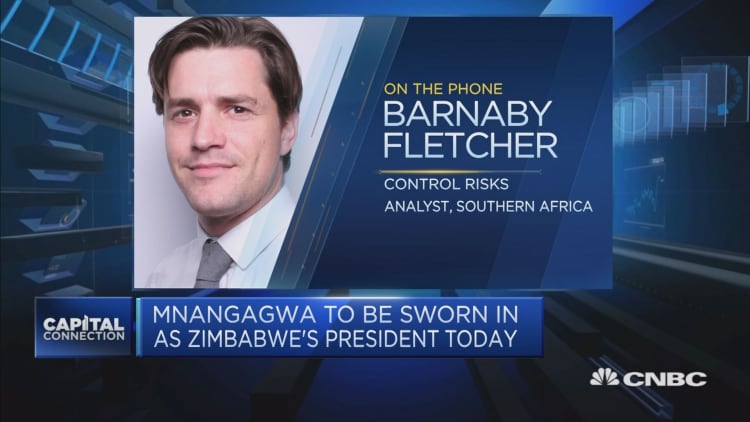China's deep-rooted relationship with Zimbabwe, formed under recently deposed leader Robert Mugabe, has weakened in recent years. But under the watch of new President Emmerson Mnangagwa, seen as a friendlier face to Beijing's commercial interests, bilateral ties could strengthen.
In fact, many speculate that it was China's concerns over its investments that resulted in the Nov. 14 coup that ousted Mugabe — a charge that Chinese President Xi Jinping's administration has denied. Regardless, close ties are widely expected under Mnangagwa, billed as a pro-business figure committed to increasing foreign inflows.
"Beijing has bankrolled Mugabe and his wife for years and will cozy up to Mwangagwa now," Pinak Chakravarty, distinguished fellow at the Observer Research Foundation, a New Delhi-based think tank, said in a Monday note.
Concerns over Mugabe's policies
Since Mugabe assumed power in 1980, Beijing has fostered intimate political, military and personal ties with the controversial politician, providing his government with interest-free loans — a relationship that's resulted in hefty Chinese investments within Zimbabwe's tobacco, diamond and power industries.
China has backed Mugabe even as he was slammed in the West for despotic rule — in 2008, Beijing vetoed a United Nations resolution that would have imposed an arms embargo and financial restrictions on the African leader.
But links have soured as of late. Mugabe's indigenous law, which requires foreign companies to have majority black Zimbabwean ownership or face the risk of closure, was a major source of tension as it endangered Chinese commercial projects. Mugabe's move to nationalize Zimbabwe's diamond mines also irked Beijing, whose state-owned companies are major players in local diamond fields.
"As Zimbabwe's largest source of foreign investment, Chinese investors are inevitably impacted ... dissatisfaction is rampant among many in China, who question the solidity and future of the special friendship between the two countries," said a 2016 Brookings report.
Mnangagwa seen as more investor-friendly
In that respect, 75 year-old Mnangagwa, who received training in China, is seen as a better bet than his predecessor. Despite being Mugabe's right-hand man, the former vice president — nicknamed "the Crocodile" — is widely expected to get rid of nationalist laws and focus on restoring the Zimbabwean economy and land reforms.
"Following Mugabe's resignation, China's foreign ministry went out of its way to praise the friendship between China and Zimbabwe, and Mnangagwa can be expected to continue that relationship," Hannah Ryder, former head of policy and partnerships for the United Nations Development Program in China, wrote in a Project Syndicate editorial on Friday.

Harare is part of Beijing's Belt and Road initiative and a major source of resource wealth.
China's role in the coup
Those who believe Xi's administration was involved in Harare's regime change say it's no coincidence that Zimbabwean army chief Constantino Chiwenga visited Beijing just days before the military takeover.
China's foreign ministry said the visit was a "normal interaction" and arranged a long time prior.
"China may have subtly backed the military and Mwangagwa, preferring this combine to the coterie led by Mugabe's wife Grace, given the latter's legendary reputation for corruption," said Chakravarty.
Adding to the speculation are reports of the Zimbabwe National Army deploying Chinese-made Type 89 armored vehicles during the coup. Neither the United Nations nor the Stockholm International Peace Research Institute had any record of Type 89s being delivered to Zimbabwe, IHS Jane's said in a recent note, adding that none of the army's other types of armoured vehicles were seen during the operation.
Beijing's sole priority is ensuring friendly bilateral relations that will allow commercial development in Zimbabwe to continue, regardless of who's in power, according to experts.
"Beijing's interest is in a better investment climate in Zimbabwe," stated Alex Vines, head of the Africa program at Chatham House.

